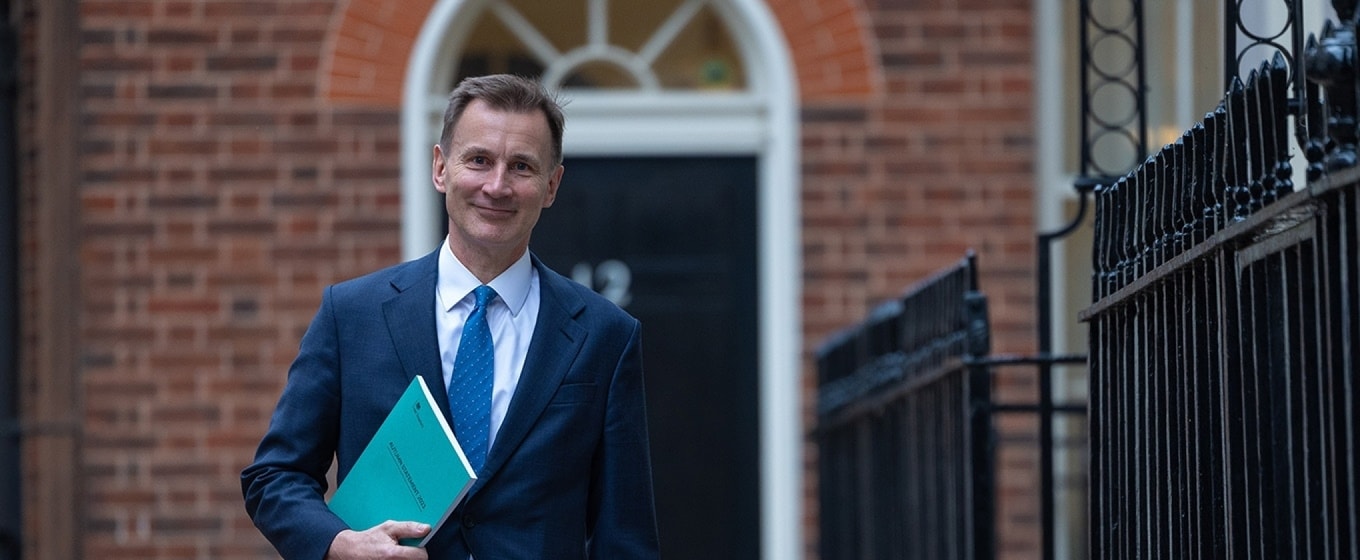At 12.30pm on 22 November 2023, Jeremy Hunt, The Chancellor of the Exchequer, delivered the highly anticipated Autumn Statement in the House of Commons. This probably marks the government's final mini-budget before a potential general election, as hinted by Prime Minister Rishi Sunak, who has suggested that it might take place in October next year.
The Office for Budget Responsibility (OBR) has also released their latest economic outlook for the UK today.
This Autumn statement covered reducing debt, cutting taxes, and how they plan to back British businesses. Read on to find out what else has been revealed that could affect small businesses and the self-employed.
Economic outlook
Inflation has dropped by 4.6%, down from 6.7% for the previous month, and more than double the Bank of England’s expected target.
For the new year ahead, the UK government will tightly control inflation. Therefore, the updated figures from the Autumn Statement show that the economy is projected to grow by 0.6% amidst the global pandemic and energy crisis.
With new schemes, Mr Hunt said they will attract £20bn more business investments a year in the next decade, bringing tens of thousands of people into work, supporting growing industries, and lowering borrowing and debt.
The conservative party celebrates the most significant business tax cuts in modern British history, ready for years of growth and an increased investment incentive.
Business rates frozen for SMEs
Business rates are to be frozen for small businesses for a further year, as well as 75% business rates relief for eligible retail, hospitality, and leisure companies.
Independent shops could save twenty thousand pounds as Mr Hunt freezes small business multipliers for another year. It will extend financial incentives for investment zones and tax reliefs, a positive for small businesses.
Self-employed and National Insurance
For the self-employed, Mr. Hunt wanted to make a reform and simplify tax so Class 2 National insurance is to be abolished, saving on average £192 a year. Access to entitlements such as state pension and credits will be maintained in full.
Class 4 National insurance to be cut by 1%, totaling 8% to be paid, for the self-employed earning profits between £12,570 and £50,270.
Hunt said, from April 2024 the cut to the initial rate by one percentage point will save the average self-employed person £350 a year.
Mr Hunt promised this would protect our hard-working people who got us through the pandemic and save the average self-employed person hundreds of pounds, leading to more significant growth and safety to provide for their families.
National living wage increase
The national living wage is set to rise in April 2024 to £11.44, representing an increase for full-time take home by 30% compared to 2010. Supporting our lower income jobs to help provide them with enough money to survive and thrive.
Small businesses with employees will need to make sure they’re complying with the latest rates of pay for staff.
Late payment reforms
The government has promised to take more robust measures against companies that consistently delay payments for SME invoices.
The Cash Flow and Prompt Payment Review has already been published, and the Procurement Act ensures that 30-day payment terms are expanded to cover all subcontractor invoices throughout the supply chain for public sector contracts.
In addition, any company vying for significant government contracts must prove that they settle their own invoices within an average of 55 days. This requirement will be further tightened to 40 days by April 2025 and reduced to 30 days in the subsequent years.
Alcohol duty freeze extended
The temporary freeze on alcohol duty has been extended until 1st August 2024, and they’ll announce the new alcohol duty rates in the Spring Budget next year.
Business tax changes
The business tax break, referred to as 'full capital expensing,' has been made a permanent fixture.
This investment allowance serves to lower the corporation tax obligations for businesses making investments in the UK. For every £1 invested in IT, machinery, and equipment, businesses can now reclaim 25p in corporation tax.
In practical terms, this allows businesses to subtract the costs of these items from their profits, thereby reducing the amount of corporation tax they are required to pay.
Originally introduced in April 2023 following the Spring Budget, this tax break was initially set to conclude in 2026. However, it has now been made a permanent feature.
R&D relief
Research and Development (R&D) relief offers small businesses a means to lower their tax liabilities through investments in research and development.
The government has affirmed the merging of the existing R&D Expenditure Credit and SME schemes starting from April 2024. This move aims to simplify the process for businesses seeking R&D relief.
"Reducing tax on workers will make more people want to work", these were Mr Hunt's concluding words from the Autumn Statement.
We hope this snapshot has given you crucial information from this Autumn Statement. However, the government's website provides full details if you’d like to see what else was announced by the Chancellor.
Header image by HM Treasury.




These cookies are set by a range of social media services that we have added to the site to enable you to share our content with your friends and networks. They are capable of tracking your browser across other sites and building up a profile of your interests. This may impact the content and messages you see on other websites you visit.
If you do not allow these cookies you may not be able to use or see these sharing tools.